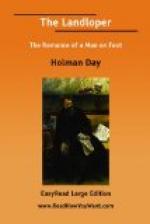“A stray dog!” he muttered. “Of as much account—and he’d better forget the sister of the rose. Here’s a good place to put imagination to sleep—here’s a place where all is asleep.”
He went on around the curtain of the alders.
There was a big old-fashioned house near at hand. Its walls were weather-worn, its yard was not tidy. The faded curtains at the windows hung crookedly. The glass of the panes was dirty. The entire aspect of the place indicated that there was no woman’s hand to make it home. It was commonplace and uninteresting.
But the front door was flung open suddenly with a screech of rusty hinges.
Then came backing out of the doorway a very old man—a bent and wrinkled old man with long white hair which trailed down from under a broad-brimmed hat. He was dragging a coffin, single-handed. The free end of the solemn box bumped down the wooden steps with a hollow clatter that suggested emptiness. There was a woodpile at one side of the yard. The old man tugged the casket over the litter of chips and dropped the end. He wrenched an ax from its cleft in a chopping-block and caved in the top of the coffin with the first blow.
The man Farr, observing from the road, saw that the casket was empty. The old man continued to bash and batter.
The wayfarer, before the destruction was begun, had time to note that the coffin was a remarkably fine specimen of cabinet-maker’s work. There were various sorts of wood inlaid with care, and the fretwork along its sides had been jig-sawed with much pains spent in detail, and the pilasters were turned with art. But the old man battered at all this excellence with savageness. It was evident that he was not merely providing kindling-wood—he was expending fury.
It was an affair that demanded undivided attention from the observer in the road; but a man came around the corner of the house just then and Farr promptly gave over his interest in the aged chopper.
The new arrival was clothed cap-a-pie in armor.
He stood quietly at a little distance and gazed from under his vizor on the energetic old man at the woodpile.
Farr noted that the armor was obviously home-made. The helmet, though burnished and adorned with a horse’s tail, had the unmistakable outlines of a copper kettle. The cuirass could not disguise its obligation to certain parts of an air-tight stove. But the ensemble was peculiarly striking and the man in the road took a quick glance around at the New England landscape in order to assure himself that he was still where he supposed he was.
Farr went to the fence and folded his arms on the top.
The old man, resting a moment, seemed to feel that intent regard from behind and, without turning his body, hooked his narrow and bony chin over his shoulder and swapped a long stare with the stranger.
“Well,” inquired the venerable chopper, “what is on thy mind, sir?” His tone was sour.




